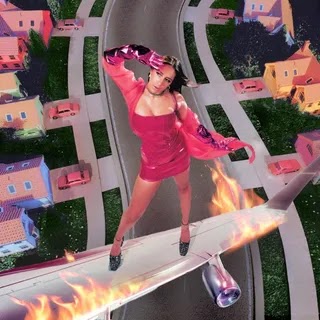Even when she’s singing about self-loathing, the 18-year-old pop star and dancer exudes a swagger. Her full-length debut proves she’s capable of transcending online virality.
Tate McRae’s a tortured romantic, burdened by bad lovers and friends who don’t understand her. Despite being one of the most egregious “indie pop voices” in recent memory, she’s a strong singer, as comfortable slinking across broody pop-trap as she is belting over piano-driven ballads. Her sound is sandwiched somewhere between Billie Eilish and Olivia Rodrigo, and, like Rodrigo, McRae revels in heartbreak, surveying the pop landscape to see which style best suits her sad-girl anthems. Her full-length debut, i used to think i could fly, announces McRae as a legitimate pop star capable of transcending the online virality that launched her career, but she’s often too beleaguered to take it all in. “You say I should be on top of the world/But I’m not feeling much,” she sings on “go away,” and the admission seems intended to resonate beyond celebrity and reach any number of people struggling to find a silver lining.
Like so many before her, McRae was discovered on YouTube. A competitive dancer and content creator living in Calgary, she found her initial breakthrough at 14, when she posted a video of an original song, “One Day,” which has since amassed almost 40 million views; the official release was certified gold in Canada. The song spurred a label bidding war won by RCA, which vowed to support McRae’s dance career and, for her first EP, gifted her a song co-written by Eilish and Finneas. She landed a hit in 2020 with “you broke me first,” a triumphant trap-infused ballad that tore through TikTok in the early months of the pandemic. But the song’s stratospheric success—a billion streams and counting across all platforms—didn’t translate to megastardom. Without the Disney Channel fame and off-camera love triangle that bolstered Rodrigo’s “drivers license,” McRae’s song appeared to be just another viral smash. It was good, maybe even great, but the lack of narrative momentum stifled her bid for placement beside nascent icons like Eilish and Rodrigo.
i used to think i could fly proves she has more big songs in her. Working with a team of hitmakers including Greg Kurstin, Charlie Handsome, and Blake Slatkin, McRae tries her hand at the type of pop suited for an Abercrombie store—AI-generated pop-punk, Kid Laroi-style soft trap, etc. She’s adept at sliding between sounds, exuding a swagger even when singing about self-loathing. Standouts “hate myself” and “feel like shit” both manage to extract meaning from suffering. On the latter, McRae’s voice soars with anguish, capturing the theatrical agony of a breakup: “I won’t lie, I thought I might die…And maybe I’ll get used to it, but right now I just feel like shit.” It can be cathartic to give into grief, even if the concession is fleeting, and McRae’s acceptance of this pain reads as vaguely empowering.
The album’s not always so introspective. Often, empowerment comes in the form of vindication as she thrashes exes for being spineless and stupid. On tracks like the “Ride Wit Me”-interpolating “don’t come back” and the alt-rock-inflected “what would you do?”, McRae’s almost giddy with bitterness, shifting her sadness into sneering resentment. “Never left your dad’s basement/Now you’re mad that I made it,” she sings on “i’m so gone,” feigning pride to momentarily mask the debilitating hurt she expresses throughout the record. There’s an authenticity to this sort of self-delusion; McRae’s nursing her ego, convincing herself she’s superior to her ex. It’s only when her language becomes impersonal that the empowerment turns trite. On the painfully flat “boy x,” heartache warps briefly into narcissism: “There’s a billion of boy x, but, babe, there’s only one of me.” On an album stuffed with incisive insights into failed romance, moments like this feel out of step.
In a recent interview with Zane Lowe, McRae discussed the difficulty of developing an artistic identity as an industry-anointed pop star: “I probably did a million writing sessions this summer with a million different people,” she said. “That was the hardest part—actually having the confidence to speak up and [say], ‘No, no, no: this is what my album’s about.’” Apart from some missteps—like the excruciating Finneas-produced “i still say goodnight”—i used to think i could fly soars with confidence, a record that remains absolutely sure of itself even as McRae’s emotions vacillate between bravado and self-immolation.



0 comments:
Post a Comment